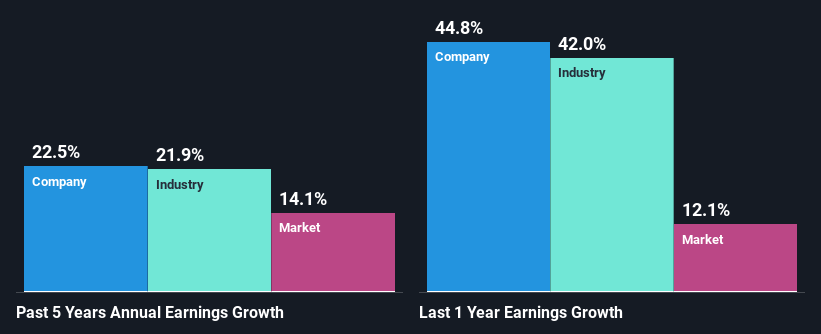Do Fundamentals Have Any Role To Play In Driving SD Guthrie Berhad's (KLSE:SDG) Stock Up Recently?
Most readers would already know that SD Guthrie Berhad's (KLSE:SDG) stock increased by 4.9% over the past three months. We wonder if and what role the company's financials play in that price change as a company's long-term fundamentals usually dictate market outcomes. Specifically, we decided to study SD Guthrie Berhad's ROE in this article.
ROE or return on equity is a useful tool to assess how effectively a company can generate returns on the investment it received from its shareholders. Simply put, it is used to assess the profitability of a company in relation to its equity capital.
View our latest analysis for SD Guthrie Berhad
How Do You Calculate Return On Equity?
The formula for ROE is:
Return on Equity = Net Profit (from continuing operations) ÷ Shareholders' Equity
So, based on the above formula, the ROE for SD Guthrie Berhad is:
10% = RM2.1b ÷ RM21b (Based on the trailing twelve months to June 2024).
The 'return' is the profit over the last twelve months. So, this means that for every MYR1 of its shareholder's investments, the company generates a profit of MYR0.10.
What Is The Relationship Between ROE And Earnings Growth?
Thus far, we have learned that ROE measures how efficiently a company is generating its profits. Depending on how much of these profits the company reinvests or "retains", and how effectively it does so, we are then able to assess a company’s earnings growth potential. Assuming everything else remains unchanged, the higher the ROE and profit retention, the higher the growth rate of a company compared to companies that don't necessarily bear these characteristics.
SD Guthrie Berhad's Earnings Growth And 10% ROE
When you first look at it, SD Guthrie Berhad's ROE doesn't look that attractive. However, given that the company's ROE is similar to the average industry ROE of 10.0%, we may spare it some thought. Looking at SD Guthrie Berhad's exceptional 23% five-year net income growth in particular, we are definitely impressed. Taking into consideration that the ROE is not particularly high, we reckon that there could also be other factors at play which could be influencing the company's growth. For instance, the company has a low payout ratio or is being managed efficiently.
We then performed a comparison between SD Guthrie Berhad's net income growth with the industry, which revealed that the company's growth is similar to the average industry growth of 22% in the same 5-year period.

Earnings growth is a huge factor in stock valuation. The investor should try to establish if the expected growth or decline in earnings, whichever the case may be, is priced in. Doing so will help them establish if the stock's future looks promising or ominous. If you're wondering about SD Guthrie Berhad's's valuation, check out this gauge of its price-to-earnings ratio, as compared to its industry.
Is SD Guthrie Berhad Using Its Retained Earnings Effectively?
The three-year median payout ratio for SD Guthrie Berhad is 48%, which is moderately low. The company is retaining the remaining 52%. This suggests that its dividend is well covered, and given the high growth we discussed above, it looks like SD Guthrie Berhad is reinvesting its earnings efficiently.
Moreover, SD Guthrie Berhad is determined to keep sharing its profits with shareholders which we infer from its long history of seven years of paying a dividend. Upon studying the latest analysts' consensus data, we found that the company is expected to keep paying out approximately 56% of its profits over the next three years. Regardless, SD Guthrie Berhad's ROE is speculated to decline to 7.6% despite there being no anticipated change in its payout ratio.
Summary
In total, it does look like SD Guthrie Berhad has some positive aspects to its business. Despite its low rate of return, the fact that the company reinvests a very high portion of its profits into its business, no doubt contributed to its high earnings growth. That being so, according to the latest industry analyst forecasts, the company's earnings are expected to shrink in the future. Are these analysts expectations based on the broad expectations for the industry, or on the company's fundamentals? Click here to be taken to our analyst's forecasts page for the company.
Have feedback on this article? Concerned about the content? Get in touch with us directly. Alternatively, email editorial-team (at) simplywallst.com.
This article by Simply Wall St is general in nature. We provide commentary based on historical data and analyst forecasts only using an unbiased methodology and our articles are not intended to be financial advice. It does not constitute a recommendation to buy or sell any stock, and does not take account of your objectives, or your financial situation. We aim to bring you long-term focused analysis driven by fundamental data. Note that our analysis may not factor in the latest price-sensitive company announcements or qualitative material. Simply Wall St has no position in any stocks mentioned.
 Index Options
Index Options CME Group
CME Group Nasdaq
Nasdaq Cboe
Cboe TradingView
TradingView Wall Street Journal
Wall Street Journal